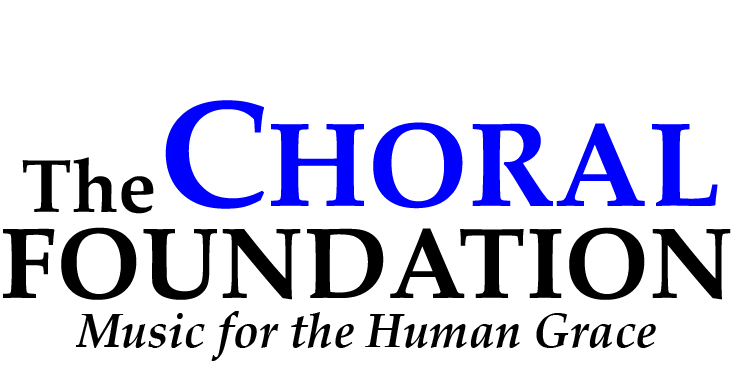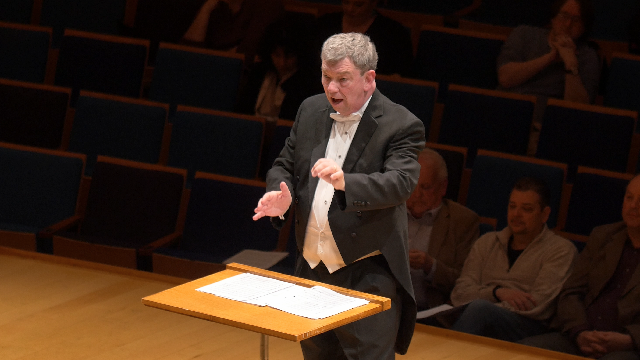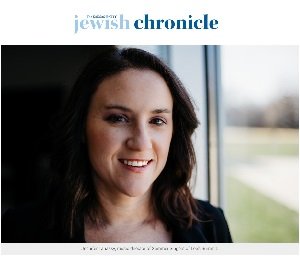By Hannah Edgar | Chicago Tribune PUBLISHED: February 10, 2025 at 5:30 AM CST
Ed Frazier Davis is the son of the late Sir Andrew Davis, the longtime music director of Lyric Opera. Ed is participating in two memorial concerts for his father. (E. Jason Wambsgans/Chicago Tribune)
Ed Frazier Davis realized he wasn’t like other kids pretty early on. How many kids lived in a high-rise on the Mag Mile? Had the Lyric Opera House as their personal playground? Performed onstage for thousands of people by the time they were in middle school?
For Davis, all that and more was possible because his father was the smiling, bright-eyed man on the Lyric Opera podium: Sir Andrew Davis, the house’s music director from 2000 to 2021. His mother, Gianna Rolandi, was an operatic soprano and director of Lyric’s Ryan Opera Center for early-career singers.
It wasn’t long before little Ed became a chip off the old block. Early on in Sir Andrew’s tenure, Ed was cast as a cabin boy in a 2001 Lyric production of “Billy Budd.”
“My dad loved to tell the story about how, at one point in the dress rehearsal, one of the singers got off by a few beats. But I came in at the right time. Afterward, my dad said something to the effect of, ‘That was great. You got back on track.’ And I said, ‘Well, Dad, I listened to the orchestra!’” Davis recalls. “He was just so pleased by that. ‘Chuffed,’ as he would say.”
Davis’s next Lyric bow will be on Feb. 15, his father’s memorial concert. The elder Davis died last April after battling leukemia. The concert — free with a suggested donation to Lyric, per his wishes — includes a piece by Ed, now a composer and conductor himself, and singers from across Sir Andrew’s decades-long international career.
Among those singers is soprano Christine Goerke, who last sang at Lyric as Brünnhilde in its pandemic-foiled “Ring” cycle. She estimates she’d worked with Sir Andrew on at least a half-dozen productions.
“You always felt safe in his hands. Wagner can be so bombastic — you can get lost and drowned out,” Goerke says. “I never felt that way with him … I felt like I could fly.”
Mezzo-soprano Elizabeth DeShong — who started her career in Lyric’s Ryan Opera Center and has since sung 14 roles with the company — agreed.
“It was the greatest feeling to sing for Andrew and see this smile spread across his face,” she reminisces. “The twinkle in his eye, the knowing grin, the unspoken understanding that you were creating something beautiful for the world. It was pure and without ego.”
A few weeks later, Ed Davis follows the concert with his own tribute on March 8, featuring his choir Vox Venti. To mark the occasion, the choir commissioned a new work by Roxana Panufnik, who became close to Sir Andrew while preparing her “Songs of Darkness, Dreams of Light” for the last night of the 2018 BBC Proms. The piece, “Heroic Hearts,” sets “Ulysses” by Alfred, Lord Tennyson, one of Sir Andrew’s favorite poets.
“We have a very unique connection, because she also had a famous conductor dad,” Davis says of Panufnik.
Sir Andrew Davis, center, takes a curtain call with Renee Fleming as Hanna Glawari and Thomas Hampson as Count Danilo Danilovich after a full dress rehearsal of “The Merry Widow” at the Civic Opera House, Nov. 11, 2015, in Chicago. (John J. Kim/Chicago Tribune).
Indeed, even the general sketches of Davis’s biography carry his parents’ stamp. He was born in Spartanburg, his mother’s hometown, “sort of strategically” so he could have dual American and British citizenship. He grew up in the UK, in rural Rodmell — an easy commute for Sir Andrew to the Glyndebourne opera festival. An elderly neighbor had been one of the unfortunate youth to drag Virginia Woolf’s lifeless body from the River Ouse. Other than that, Rodmell was quiet, uneventful. Just as Sir Andrew liked it.
“My dad was a very down-to-earth guy. He and my mom both came from very poor backgrounds. They raised me to never take our financial situation for granted,” Davis says.
Ed Davis now considers himself an American, having spent twice as long in the States as Great Britain — though, at Knox College in Galesburg, he would revert back to a British accent whenever he “reached a certain level of intoxication.” There, he planned to carve a path independent of his parents.
“My initial intent was to pursue a creative writing degree. My mindset at the time was, ‘Well, I’ll never be as successful as my parents. So why should I try to pursue music professionally?’” he says.
That changed partway through college. During an American lit course, Davis read an Emily Dickinson poem and, for the first time, heard music. He penned his first choral setting and never lost the composing bug. Sir Andrew conducted Ed’s pieces increasingly in recent years, even including one — “A Seed of Joy,” a partner piece to Beethoven’s Ninth — on his 2022 retirement concert at Lyric.
Music Director Sir Andrew Davis works Sept. 20, 2016 during rehearsal for “Das Rheingold” at the Lyric Opera. (Brian Cassella/Chicago Tribune)
After Rolandi died in 2021, Davis composed “Mother and Child” in tribute to her — a piece which will be reprised at Lyric’s memorial concert. His “Set Me as a Seal” will be included on the Vox Venti program, alongside British choral music which was close to his father’s heart.
Unlike his son, Sir Andrew resisted calling himself a composer. Nonetheless, in recent years, he started arranging Bach organ pieces — organ was the first instrument he played professionally — and Handel’s “Messiah.” The last concert he conducted, with the Chicago Symphony, featured his own boisterous, exuberant reorchestration of the oratorio.
After his wife’s death, Sir Andrew traded the hustle and bustle of downtown Chicago for a house in Old Irving Park, close to Ed. It wasn’t quite the English countryside, but they were able to get dinner together at least weekly in the last year of his life.
“He was thrilled to find a new home that was not surrounded by tall buildings,” Ed Davis says.
At Lyric’s memorial concert, Goerke will sing “Es gibt ein Reich,” from Richard Strauss’s “Ariadne auf Naxos.” “It’s completely apropos. She’s talking about yearning for death, because everything is awful here,” she says. “It’s funny, cheeky and beautiful at the same time, and I don’t think I could think of any more adjectives that better describe Sir Andrew.”
A young Ed Davis with father Andrew Davis and mother Gianna Rolandi in 1996 at the family’s home in Rodmell, East Sussex, England. (Provided by Ed Davis)
For all the hustle and bustle of Sir Andrew’s life, Davis is struck, in his death, by how attentive of a family man he was. “He always made time for my mom and me,” he says.
One memory sticks out. Davis has grappled with severe depression his entire life. He first harbored suicidal thoughts at just 15. One night, during a particularly brutal episode, he was crying in bed. Sir Andrew heard him from the hall.
“He just laid with me until I felt better,” he says. “It’s just the kind of guy he was.”
Ed spoke to the Tribune the day before what would have been his father’s 81st birthday, on Feb. 2. To celebrate, he planned to go to evensong at a church in Evanston — like any good Brit, Sir Andrew loved Anglican choral music — and “have a Negroni, his favorite.”
“I think maybe my dad’s biggest mission in life was to make everybody, from the Yo-Yo Mas of of the world to the last-row violinists and stagehands, be excited to make music for a living,” he says. “It’s a unique place to be in, being the child of someone who is not only famous but also unusually and universally adored.”
Hannah Edgar is a freelance critic.
The Rubin Institute for Music Criticism helps fund our classical music coverage. The Chicago Tribune maintains editorial control over assignments and content.
“A Concert Celebrating the Life of Sir Andrew Davis,” 7:30 p.m. Feb. 15 at Lyric Opera of Chicago, 20 N. Wacker Drive; tickets free with suggested donation, lyricopera.org
“In Memoriam Sir Andrew Davis,” 7:30 p.m. March 8 at St. Luke’s Episcopal Church, 939 Hinman Ave., Evanston; general admission tickets $25, reserved seating $75, voxventi.org



























